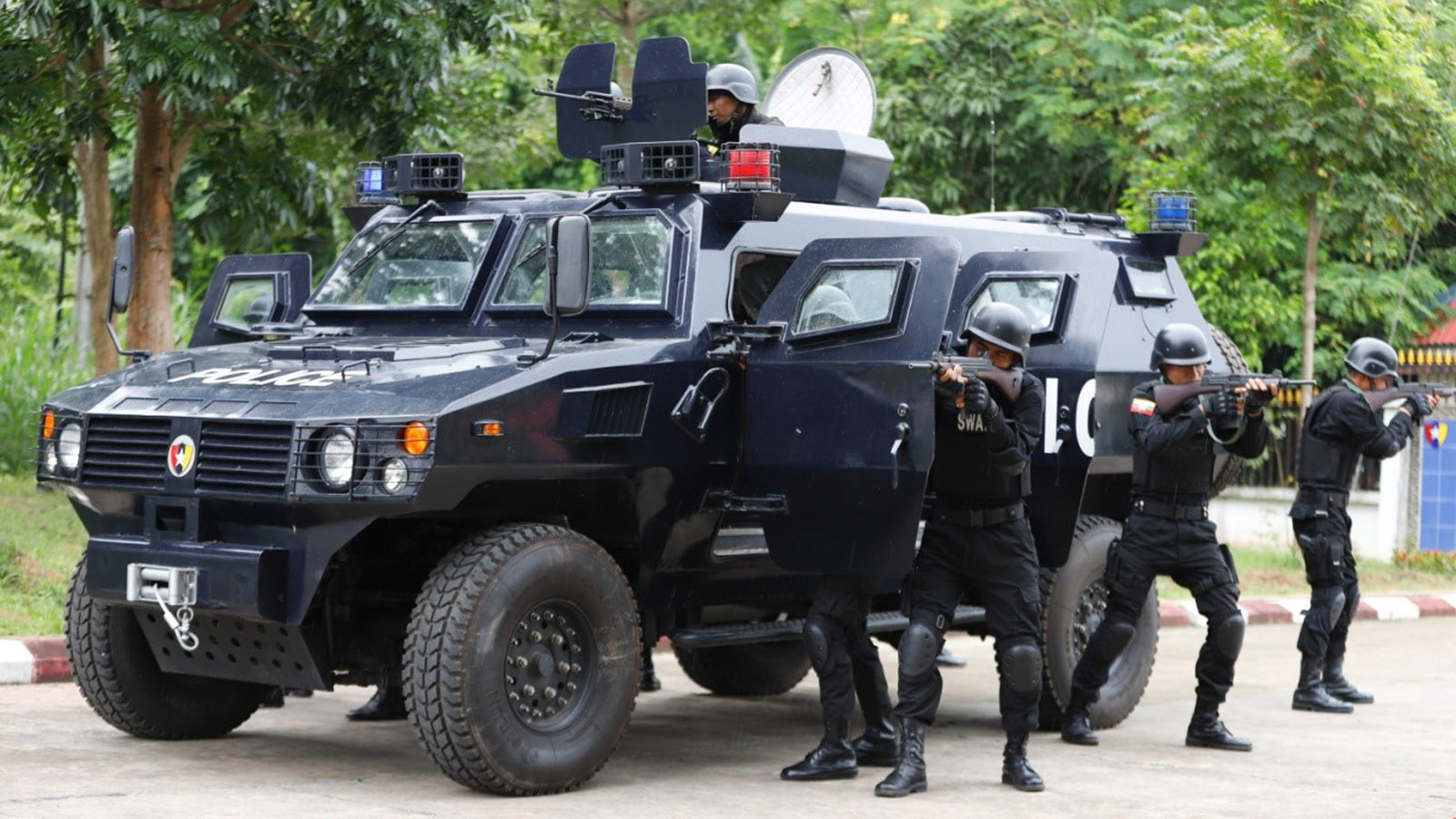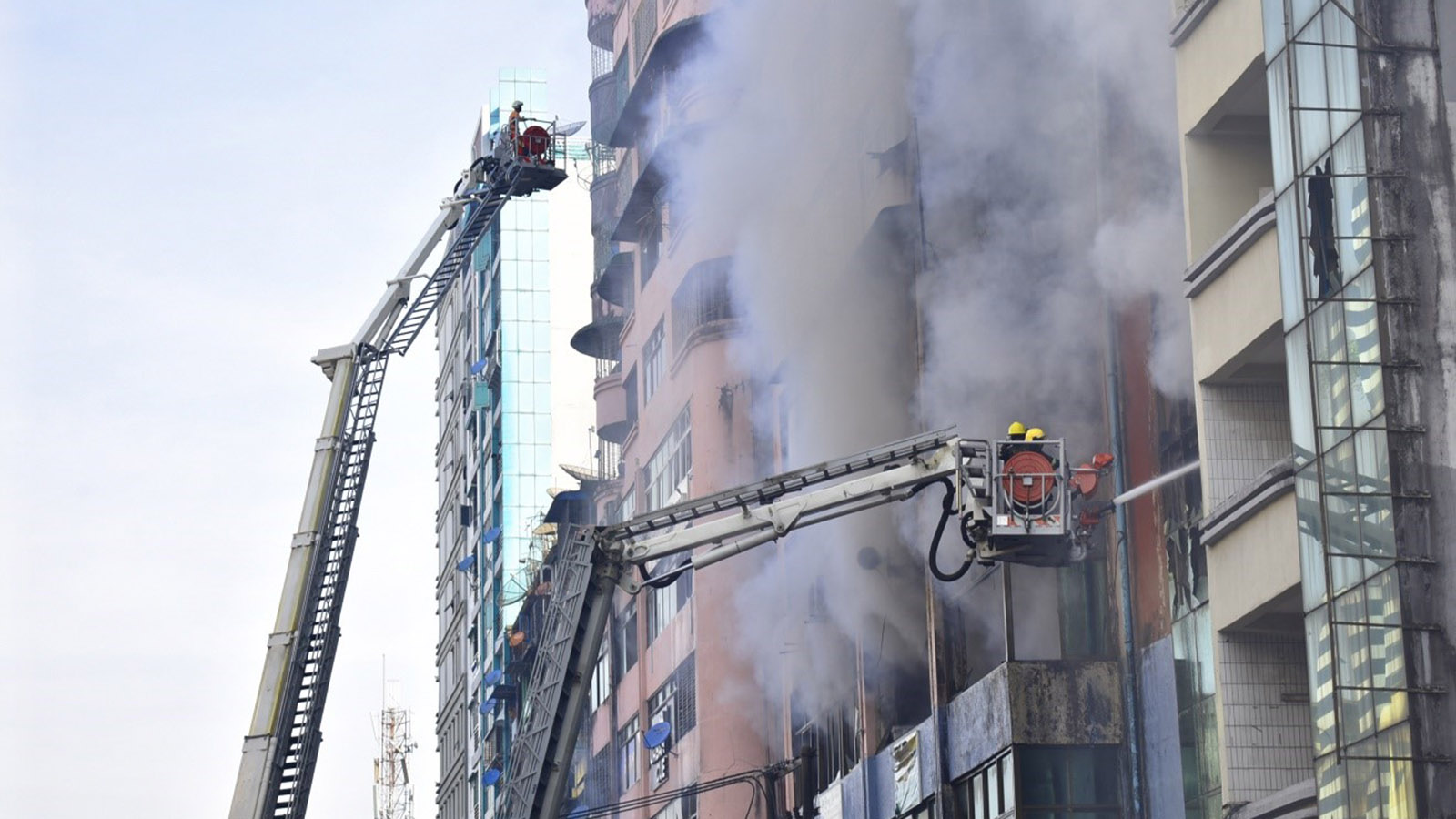April 25, 2020
“MPF is in the process of transforming its functions into public-oriented services. We have adopted the ways of approach”: Police Col Kyaw Thiha
By Shin Min, Photo: Kay Kay (MOHA)
The transformation of laws enacted throughout the past successive periods into the ones that are in conformity with the changing trends and the policy of the government in office and that protect the public interest during the four-year period of the present administration is included into the reforms made by the Ministry of Home Affairs.
Of the 34 enacted laws, 19 will remain unchanged, two is being amended, 10 will be replaced with the new laws and three are being drafted, said U Khaing Tun Oo, Director-General of the Ministry of Home Affairs.
Activities of MPF
During the four years, the Myanmar Police Force (MPF), one of the institutions under the ministry has set up Command Centers in Nay Pyi Taw and Yangon and Mandalay Regions as an emergence response facilities for public tip offs and requirements.
MPF is also giving response to information sent by the public and help asked by the people by setting up Hot Lines, Social Network Accounts, CCTVs and related equipment for 24-hour monitoring and round-the-clock duty assignments.
“MPF is in the process of transforming its functions into public-oriented services. We have adopted the ways of approach – public participation, problem-solving-oriented system and information-based system – in carrying out the process,” said Police Col Kyaw Thiha.
MPF extended one district police commander’s office, two area police stations and seven police posts during the fourth-year of the current administration to protect public interest, and for internal security and community peace. And during the four years, MPF extended three district police commander’s offices, 27 area police stations and 31 police posts.
MPF has deployed No (1) border police control office and eight police border guard companies at the country’s western gate for the safety of the border areas of Rakhine State.

During a period of three years, MPF held 26 meetings between Myanmar and Bangladesh border troops for the safety of the common border. It held four such meetings in the fourth year. The result is that the two countries could conduct joint land and water patrols for 316 times. MPF is drawing a program to expose and arrest absconders in accord with the national strategy. It has extended and improved scientific tests and opened a new DNA department for ensuring fair court trials.
MPF is making contacts with international police forces, ASEAN police forces, police forces of neighbouring countries and European police forces to curb cross-border crimes. It opened four Border Liaison Offices (BLO) with China, two with Laos, three with Thailand, one with Bangladesh and three with India, totalling 13. Anti-drug law was amended to meet the international standard, and designated the anti-drug drive as the national task. MPF opened drug information department at the President’s Office on 27 June 2018. During the four years, it arrested 592 suspects in 395 drug cases.
Police members destroyed eight stimulant tablet manufacturing camps in the fourth year alone, and exposed three heroin refineries and 14 stimulant tablet manufacturing camps during the four years.
Apart from combating crime and drugs, police members are also taking part in regional development undertakings. They took action against 570 suspects in 191 human trafficking cases and rescued 247 victims during the fourth year alone.
Bureau of Special Investigation
According to Bureau of Special Investigation (BSI), there were 671 criminal cases including cases that concerned with business, corruption, money laundering during the four-year period.
“A total of K 5.83 billion worth of cash including foreign currency were impounded from exposed criminal cases. BSI could inform the Ministry of Planning, Finance and Industry about the imposition of taxes on K 536.43 billion and USD 18.57 million,” said U Soe Myint Lay, director of legal and services division of BSI.
BSI is prioritizing criminal cases that hurt the public, that cause financial losses of the State, and cases in connection with corruption and money laundering. It is also carrying out the assignments given to it by the President’s Office, Union Government’s Office and the Ministry of Home Affairs. It is also investigating the special cases under the assignment of the Ministry of Home Affairs.
BSI was an institution legally set up under the Ministry of Home Affairs. It investigated and exposed 268 cases in connection with money laundering during the four years. Thanks to the BSI, the government could impound 2.172 billion worth of cash and materials during the period, said the official.
Correction Department
During the four-year period of the incumbent government, the Ministry of Home Affairs conducted amnesty for 16 times releasing 29,524 male and 2,306 female citizen prisoners and 162 foreigner prisoners, totaling 31,996.
During the four years, Correction Department of the ministry conducted Three R courses, religious activities, vocational trainings, school education, sports activities, fun fairs and health talks at the prisons.
“Mobile magician teams of the Correction Department (CD) are entertaining the prisoners all over the country. The department is holding fun fairs occasionally on the significant days. CD staff learned freehand physical exercise techniques from physical education staff officers of the Ministry of Health and Sports to act as coaches for the prisoners to do equipment-free physical exercises. The program was jointly conducted by the Ministry of Health and Sports and Correction Department under the financial aid provided by United Nations Office on Drug and Crime (UNODC),” explained an official of the CD.
A total of 1567 male prisoners and 710 female prisoners, totaling 2277 completed the Three R courses conducted at prisons and camps during the period from 2016 to 2019.
CD ensures religious freedom at its prisons and camps. There were 19,552 male and 3,897 female prisoner doing vipassana at the meditation centres of prisons and camps.
“CD conducted 30 kinds of vocational education training courses with the aim of enabling prisoners to earn their living well and enter a new life when they are released. The courses include mechanical, electrical, accounting courses, said U Ye Yint Naing,” deputy director of CD.
The continuous education program jointly conducted by the Ministry of Home Affairs and the Ministry of Education for youngsters serving their prison terms is in progress.
“During the period from 2015 to 2019, 335 prisoners sat for the matriculation examination, and of them, 168 passed. There were 10 three-distinction winners, 21 two-distinction winners and 43 one-distinction winner during the time,” said U Ye Yint Naing.
CD built a 50-bed hospital at Insein Central Prison, and one 25-bed hospital each at Mandalay Central Prison and Thayawady Central Prison. The hospitals are also treating prisons from other prisons and camps.
CD opened a new two-storey TB ward at Mandalay Central Prison with the help of United Nations Office for Project Services (UNOPS). CD also let prisoners to undergo TB treatment at the People’s Hospitals if necessary.

Fire Services Department
The Fire Services Department (FSD), an entity under the Home Affairs Ministry is also adopting programs to conduct public welfare tasks and serve the public interest during the fourth year.
“FSD is conducting door-to-door fire awareness campaigns for the safety of schools, factories, workshops, hotels, motels, markets, fuel stations, high-rise buildings. We had also conducted Fire Safety Manager Course during the period,” explained U Kyaw Naing, director of FSD.
FSD has been extended with 520 officers, 13,133 staff totaling 13,653, and 1,615 fire engines, 1,055 water tankers, 363 firefighting vehicles, 287 support vehicles, totaling 3,320. Auxiliary fire brigades now have 320 firefighting vehicles.
FSD has opened 15 region/state-level fire stations, 74 district fire stations, 314 township fire stations and 514 area fire stations.
FSD conducts Kaeru Caravan Programme at township schools for disseminating fire safety methods, reducing fire hazards, response techniques and education.
“Types of fires change alongside the national development. In accord with the international practice, FSD is charging inspection fees and fire prevention counseling fees at high-rise buildings,” said U Kyaw Naing.
FSD collected Ks 18 billion as inspection and counseling fees during the four-year period, and it transferred the cash into the government account.
In March 2019, FSD launched the 191 Report Application for the people to inform the fire stations in time. The application has received information from the public for 366 times since the date. FSD can reduce public worries and win public rust by posting latest developments on its website and Facebook pages. FSD formed 35-member township search and rescue teams and 116-member search and rescue teams in region and state capitals and Nay Pyi Taw. It also established an Insarag Light Team with 28 members in accord with the set standard of Insarag for search and rescue operations.
FSD bought 75 more fire engines, search and rescue vehicles and support vehicles with Euro 50 million provided by Organization for Economic Co-operation and Development-OECD. Thanks to the reinforcement, FSD can now carry out its operations more effectively.
The Ministry of Home Affairs is implementing its visions and missions in accordance with the existing rules and laws in the interest of the people during the four years including the fourth year. (Translated by TMT)

